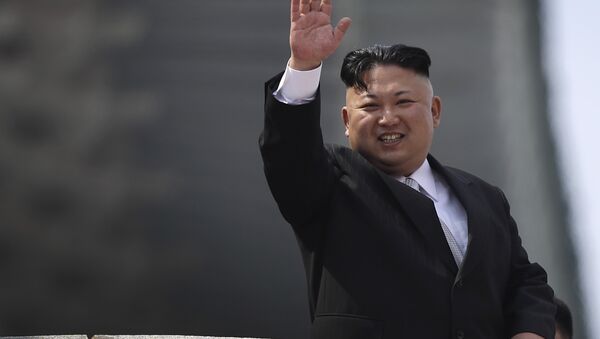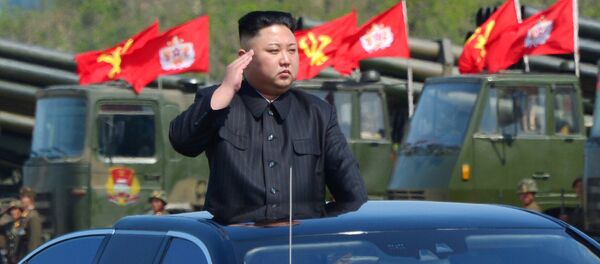In late September, North Korean officials globally circulated a missive — "Open Letter to Parliaments of Different Countries" — through its system of international embassies.
"If Trump thinks that he would bring the Democratic People's Republic of Korea, a nuclear power, to its knees through nuclear war threat, it will be a big miscalculation and an expression of ignorance. Trump threatened to totally destroy the DPRK, dignified independent and sovereign state and nuclear power. It is an extreme act of threatening to totally destroy the whole world," the letter read.
Open Letter to Parliaments of Different Countries https://t.co/mTMQJw81qO
— KCNA Watch (@KCNAWatch) September 26, 2017
It went to state the DPRK had "emerged as a nuclear power true to its name" and built the "powerful arsenal of nukes and multifarious means of delivery of nuclear weapons."
The Foreign Affairs Committee of the Supreme People's Assembly of the DPRK expressed belief that different countries in the world "loving independence, peace and justice" would take the opportunity to "fulfill their due missions and duties" in realizing the "human desire for international justice and peace," against the "heinous and reckless" Trump administration.
Australia Reacts
One recipient was Australia, via the country's embassy in Jakarta, Indonesia. Foreign Minister Julie Bishop, noting the letter was unusual.
"This is the first letter that we can find that any Australian foreign minister has received from North Korea… it's an open letter, this is not how they usually send messages around the world," Bishop said.
"This shows they are feeling desperate, isolated, trying to demonize the US, trying to divide the international community," Bishop said in an interview.
.@JulieBishopMP: This letter is evidence the pressure of sanctions being put on North Korea is working. MORE https://t.co/gnuMPC8tAY pic.twitter.com/nzmD98v0u2
— Sky News Australia (@SkyNewsAust) October 19, 2017
Prime Minister Malcolm Turnbull largely echoed Bishop's contempt, stating it was "basically a rant about how bad Trump is," in an interview with Melbourne 3AW radio.
The premier from down under went on to praise China, Australia's largest trading partner, saying Beijing's involvement in the latest set of United Nations Security Council sanctions, despite the country's "very close history with North Korea," was helping to "squeeze" Pyongyang into dropping its nuclear threats. Beijing's restrictions on oil exports were particularly effective, Turnbull stated.
The latest sanctions approved unanimously by the UN Security Council on September 11 came in response to North Korea's sixth and strongest underground nuclear test explosion on September 3 at its Punggye-ri nuclear site.
The sanctions ban Pyongyang from importing natural gas liquids and condensates as well as crude oil imports and exports of North Korean textile products, ban joint ventures and cooperative operations and bar any country from authorizing new work permits for North Korean workers, a major source of hard currency for the isolated northeast Asian nation.
Russia, EU impose fresh sanctions on North Koreahttps://t.co/88L4AN72cP pic.twitter.com/AvDbj7iyA2
— Press TV (@PressTV) October 17, 2017
Russia also exerts considerable influence in Pyongyang, and as a major world exporter of natural gas and crude oil (commodities North Korea depends upon), has used its involvement in the sanctions program to compel North Korean leaders to negotiate, rather than saber rattle, in order to resolve the dispute.
On October 19, CIA Director Mike Pompeo said North Korea may be months away from possessing nuclear weapons that can strike the US mainland, but Washington should behave as if the country were "on the cusp" of doing so anyway.
Russian State Duma International Affairs Committee Chairman Leonid Slutsky responded to Pompeo's comments October 20, suggesting they were part of "an information campaign" being waged against Pyongyang.
"Washington's policy in relation to countries that it does not like is a daily buildup of negative rhetoric about these countries. Today they can deliver a nuclear strike, tomorrow they possess chemical weapons, the day after tomorrow it is necessary to invade them, destroy their system, leader, turn them into a country without a state, as has happened in Libya and in Iraq," Slutsky said.
"The same happens with a number of other countries — North Korea, Iran and others, which are unsuitable for Washington in terms of building a unipolar global architecture," he told reporters.
Adding that the fanning of negative rhetoric was dangerous, as it could lead to a war, Slutsky noted a similar strategy was being employed against "Iran and others," as Washington disliked their collective building of a unipolar global architecture.



